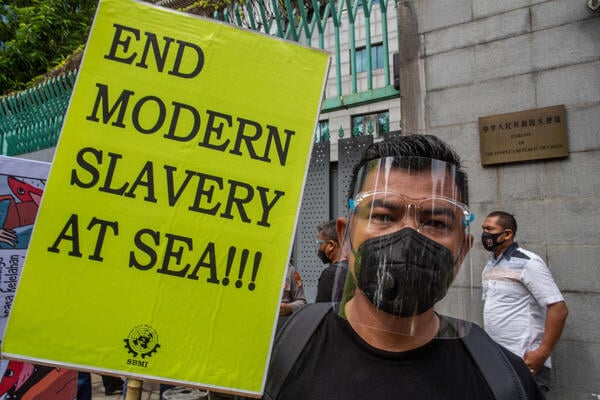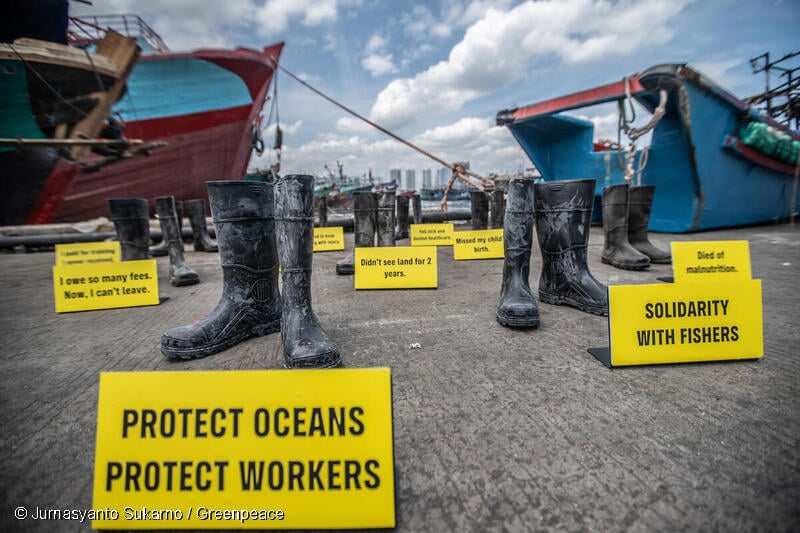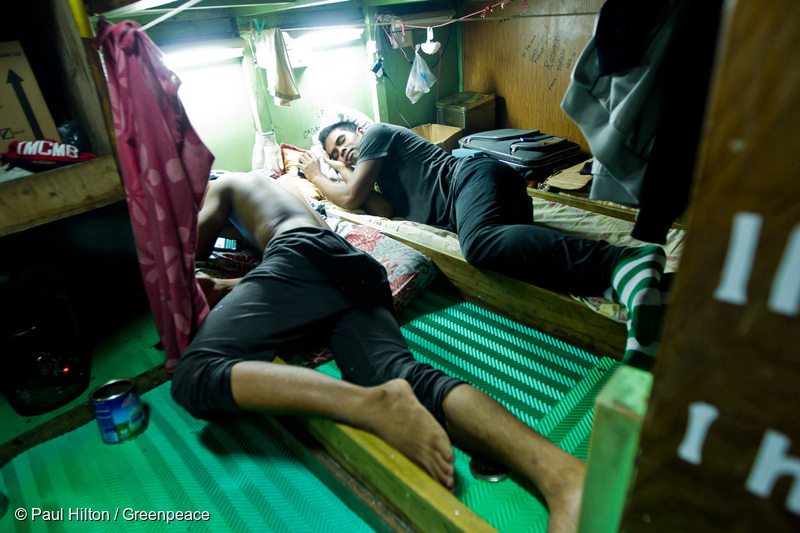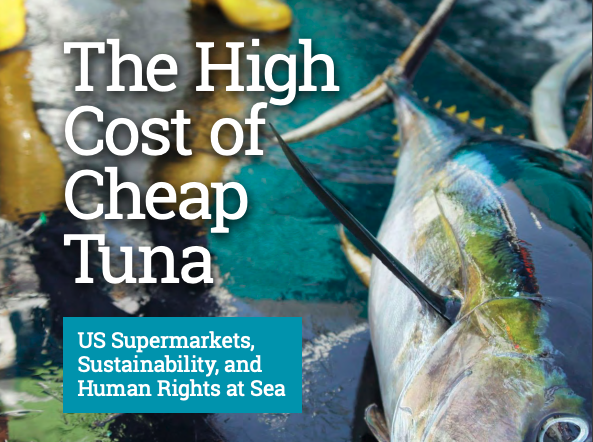Today, the US government once again awarded Taiwan a Tier 1 ranking in the most recent edition of the Trafficking in Persons (TIP) report. The high placement was granted despite the well-documented prevalence of forced labor and human trafficking in Taiwan’s distant water fishing (DWF) industry. Greenpeace USA, South East Asia, and East Asia offices, as well as several human rights and worker groups, have been calling for Taiwan to be downgraded to Tier 2.

Today, the US government once again awarded Taiwan a Tier 1 ranking in the most recent edition of the Trafficking in Persons (TIP) report. The high placement was granted despite the well-documented prevalence of forced labor and human trafficking in Taiwan’s distant water fishing (DWF) industry. Greenpeace USA, South East Asia, and East Asia offices, as well as several human rights and worker groups, have been calling for Taiwan to be downgraded to Tier 2.

Washington D.C. (June 15, 2023) – Today, the US government once again awarded Taiwan a Tier 1 ranking in the most recent edition of the Trafficking in Persons (TIP) report. The high placement was granted despite the well-documented prevalence of forced labor and human trafficking in Taiwan’s distant water fishing (DWF) industry. Taiwan has maintained Tier 1 status for the past 13 years, despite the US government designating fish from Taiwan as a product made with forced labor and blocking goods on a Taiwanese-owned and flagged fishing vessel with known forced labor abuses. Greenpeace USA, South East Asia, East Asia offices, and several human rights and worker groups have been calling for Taiwan to be downgraded to Tier 2.
Sari Heidenreich, Senior Human Rights Advisor, Global Fishing at Greenpeace USA, said: “We are disappointed by the Biden administration’s decision to rank Taiwan as Tier 1, despite concerns from workers about the Taiwanese government’s failure to make appreciable progress in protecting them from human trafficking and in prosecuting such occurrences. It sends the wrong message to the Taiwanese government and businesses assessing their supply chain risks. It offers no incentive to change the dangerous status quo that places lives at risk. And it leaves the door open for seafood produced with forced labor to enter US markets—an affront to American consumers who expect their government to keep these products off their grocery store shelves. It is crucial that the Biden administration honor its commitment to apply a whole-of-government approach to addressing human rights abuses in the distant water fishing industry and protecting workers in the US food supply chain.”
The Biden administration’s failure to downgrade Taiwan is not the first time it has fallen short of the commitment it made in June 2022 to advance a whole-of-government approach to address the interconnected issues of illegal, unreported, and unregulated (IUU) fishing, forced labor, and other human rights issues in seafood supply chains. In December 2022, the National Oceanic and Atmospheric Administration (NOAA) proposed a rule change to the Seafood Import Monitoring Program (SIMP) that civil society organizations, including Greenpeace USA, criticized as inadequate for addressing labor abuse. The proposal did not include labor abuse as a basis to add species to the SIMP, omitted labor indicators in traceability requirements, and failed to include all seafood species, which is a necessary step for closing US seafood markets to all illegally caught seafood. A March 2021 report by the International Trade Commission found that the USA imported $2.4 billion worth of seafood derived from IUU fishing in 2019.
On June 5, Greenpeace USA, alongside the Global Labor Justice-International Labor Rights Forum (GLJ-ILRF) and the Seafood Working Group, formally submitted a report to the Biden Administration recommending that Taiwan be downgraded to Tier 2 for its failure to meet the Trafficking Victims Protection Act minimum standards. The recommendations, also shared earlier this year with the Administration, were based on input gathered from Taiwanese civil society and migrant worker groups regarding Taiwan’s performance, found that in the period covered by this year’s TIP report, there was no appreciable progress and no progress at all on the majority of the TIP Office’s Prioritized Recommendations from last year’s report. To be designated Tier 1, a government must demonstrate appreciable measurable progress each year in combating trafficking.
Heidenreich continued: “I am glad to see the State Department included some of the report’s input in its Taiwan narrative; however, our report’s conclusion – that Taiwan should be downgraded to Tier 2 – was ignored. I am also disappointed that they did not include some of our most critical recommendations regarding Wi-Fi for fishers and freedom of association.”
Yuton Lee, Oceans Campaigner for Greenpeace East Asia, said: “Last year, we exposed forced labor in Taiwan’s DWF industry and demonstrated how seafood companies take advantage of the vulnerability of fishers, leading to modern slavery-tainted seafood entering US markets. This year’s TIP report fails to reflect the harsh reality of working conditions and labor rights abuses experienced by fishers aboard Taiwanese vessels and gives a pass to the Taiwanese government’s insufficient efforts to identify, investigate, and prosecute forced labor on fishing vessels in its distant water fleet. The Taiwanese government should stop celebrating its unmerited Tier 1 ranking and start acting responsibly to prevent forced labor from happening at the beginning and throughout the seafood supply chain. This includes amending relevant laws to require Taiwanese seafood companies to conduct human rights due diligence so that forced labor within the DWF industry can be prevented and products made with forced labor won’t be sold overseas.”
Arifsyah Nasution, Global Beyond Seafood Campaign Lead for Greenpeace International, said: “As long as Taiwan remains in Tier 1 in the TIP report, it is hard to expect any significant improvements on the protection of migrant fishers who work on Taiwanese fishing vessels. For years, many Southeast Asian fishers have fallen victim to human trafficking within the fishing industry, in a cycle that begins with the recruitment by manning agencies in their home countries. Most of the cases that were reported to the police and have gone through legal proceedings only dealt with perpetrators from the local manning agencies. While in fact, it is also crucial to trace the trafficking business to manning agencies in Taiwan or any other countries from which the fishing fleets originate.”
Recent investigations conducted by Greenpeace Southeast Asia and Greenpeace East Asia have revealed a high prevalence of human rights abuse and forced labor in the notoriously opaque seafood supply chain. In 2022, Greenpeace USA and Greenpeace East Asia collaborated on research that tracked the origin of Bumble Bee’s tuna cans sold in US supermarkets. The investigation confirmed that the company sourced tuna from the Da Wang, a Taiwanese-owned vessel found by United States Customs and Border Protection to have used forced labor.
###
Greenpeace USA is part of a global network of independent campaigning organizations that use peaceful protest and creative communication to expose global environmental problems and promote solutions that are essential to a green and peaceful future. Greenpeace USA is committed to transforming the country’s unjust social, environmental, and economic systems from the ground up to address the climate crisis, advance racial justice, and build an economy that puts people first. Learn more at www.greenpeace.org/usa.



